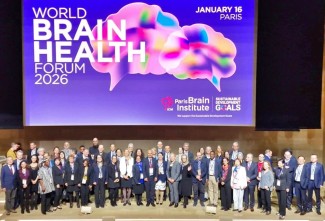In recent years, interest in psychedelics and their possible benefit in treating psychiatric illnesses has been revived. Expectations are high, especially in obsessive-compulsive disorder, where patients’ therapeutic options are still limited. At Paris Brain Institute, Anne Buot, Luc Mallet (AP-HP), and their colleagues are gathering evidence that could pave the way for large-scale clinical trials. In a new study published in Scientific Reports, they show that LSD and psilocybin have strong potential for providing long-lasting relief of patients’ symptoms.
Intrusive thoughts, involuntary repetition of undesirable gestures and behaviors combined with high anxiety… Obsessive-compulsive disorder (OCD), a disabling condition, affects around 2% of the population, regardless of age. It is a strong vector of isolation since patients disproportionately focus on various obsessions—to the detriment of relationships, work, and leisure.
Treatment mainly consists of cognitive-behavioral therapy (CBT) that allows patients to readjust their thought patterns, combined with antidepressants. Unfortunately, the effects are slow to appear, and 30 to 40% of patients do not respond at all.
“In this context, an option proposed in clinical research in the 1970s is now resurfacing: psychedelics, a family of psychotropic drugs. But since these substances are banned in many countries, clinical studies are difficult to set up, and we don’t have robust data on their effectiveness yet.”
To organize randomized, double-blind studies—the gold standard in clinical research—researchers need encouraging preliminary data… and they need it fast. Prolonged uncertainty about the efficacy of psychedelics, combined with possible media hype, may encourage recreational abuse—or uncontrolled use by vulnerable patients without medical follow-up. There’s also a risk of diverting patients from psychotherapeutic interventions that would work for them.
Spotlight on individual experience
Taking psychedelics induces an altered state of consciousness, leading the user to perceive the world in a radically new way for a few hours. The experience can be overwhelming, creating a sense of rupture with past emotional states and fostering the emergence of new thought patterns.
Previous studies suggest that the acute effects of psychedelics, present from the first dose, contrast with the delayed effects of continuous treatments, such as antidepressants. “However, we don’t know whether there is a link between users’ subjective experience and actual therapeutic effects,” Anne Buot says.
The synthetic compound LSD and psilocybin—derived from hallucinogenic mushrooms— appear especially promising in OCD. “Among other things, these substances act on certain serotonin receptors,” psychiatrist Luc Mallet says. “Unfortunately, even in animals, we don’t have sufficient data to predict their effectiveness.”
To increase their knowledge, the researchers retrospectively analyzed the experience of people who had used these substances in the past. The aim? To understand whether they had perceived an improvement in their symptoms after taking LSD or psilocybin, whether this effect was long-lasting, and whether it could be predicted by different factors. The lived experience of patients is invaluable, and in the absence of objective clinical data, it is decisive in assessing the therapeutic potential of psychedelics and guiding research.
The shape of possible efficiency
“We recruited 174 people with OCD symptoms who had taken psychedelics either occasionally or regularly via an online questionnaire. We asked them about their mental health and the treatments they received—in addition to their socio-demographic characteristics”, Anne Buot adds. “Then they were tasked to report on the context in which they had taken these substances, the dose, the nature of their psychedelic experience, and the perceived effects on symptoms.”
Participants reported the dissipation of obsessive thoughts, less need to engage in rituals, reduced anxiety and avoidance behavior, and greater acceptance of OCD. “30% of participants reported that these positive effects lasted for more than three months, which is very encouraging”, Luc Mallet adds. “Finally, we observed that the dose of LSD or psilocybin was positively correlated with the intensity of the psychedelic experience and its pleasantness.”
These results must be interpreted with caution. The subjective assessment of the therapeutic effects of psychedelics is susceptible to numerous biases, including the beliefs of the study participants.
“The population we studied generally has a very positive and enthusiastic attitude towards these substances, sometimes independently of their therapeutic effect. In addition, many patients are in situations of therapeutic impasse and expect LSD or psilocybin to improve their lives. This can significantly influence their testimony”, the psychiatrist says.
Towards robust knowledge and the definition of best practices
The transformative symbolism of the psychedelic experience itself reinforces this bias. Some people experience a sense of euphoria, ecstasy, or connection with the universe that contrasts sharply with their ordinary perception of the world and encourages them to see it with fresh eyes. “Understanding the extent to which the very nature of the psychedelic experience—strongly influenced by people’s history, culture, and imagination—affects the therapeutic effects will be essential,” Anne Buot concludes. “To do this, we will need complementary approaches, in ethnography and psychology, for example.”
To reap the full benefit of potential new treatments and establish good practices for use, it will be necessary not only to increase the number of rigorous clinical studies but also to understand the biological mechanisms underlying the long-term effects of psychedelics. Researchers believe they may increase neuroplasticity by promoting the remodeling of synaptic connections. But in this area, everything remains to be discovered.
Sources
Buot, A. et al. Improvement in OCD symptoms associated with serotoninergic psychedelics: a retrospective online survey. Scientific reports, 2023. DOI: https://www.nature.com/articles/s41598-023-39812-0







